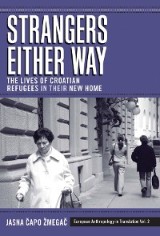Details

Strangers Either Way
The Lives of Croatian Refugees in their New HomeEuropean Anthropology in Translation, Band 2 1. Aufl.
|
38,99 € |
|
| Verlag: | Berghahn Books |
| Format: | |
| Veröffentl.: | 01.08.2007 |
| ISBN/EAN: | 9780857453181 |
| Sprache: | englisch |
| Anzahl Seiten: | 224 |
DRM-geschütztes eBook, Sie benötigen z.B. Adobe Digital Editions und eine Adobe ID zum Lesen.
Beschreibungen
<p> Croatia gained the world's attention during the break-up of Yugoslavia in the early 1990s. In this context its image has been overshadowed by visions of ethnic conflict and cleansing, war crimes, virulent nationalism, and occasionally even emergent regionalism. Instead of the norm, this book offers a diverse insight into Croatia in the 1990s by dealing with one of the consequences of the war: the more or less forcible migration of Croats from Serbia and their settlement in Croatia, their "ethnic homeland." This important study shows that at a time in which Croatia was perceived as a homogenized nation-in-the-making, there were tensions and ruptures within Croatian society caused by newly arrived refugees and displaced persons from Serbia and Bosnia and Herzegovina. Refugees who, in spite of their common ethnicity with the homeland population, were treated as foreigners; indeed, as unwanted aliens.</p>
<p> List of Maps<br> Acknowledgements<br> Maps</p>
<p> <b>Introduction</b></p>
<p> <b>Chapter 1. The Ethnology of Individuals</b><br> The individual and her/his culture<br> The relational notion of identity<br> Case study: the Srijem Croats<br> Polyphony, hybridity, levels of reading: methodological-epistemological remarks<br> The Srijem case as an instance of coethnic migrations</p>
<p> <b>Chapter 2. Srijem Croats Talk about Themselves</b><br> Exchanges<br> One's own and other people's nostalgia</p>
<p> <b>Chapter 3. Identity Building in the Local Environment</b><br> "If they are doing well, we are doing well too": resignation<br> "We will never get over it": the Srijem sorrow<br> "There's no going back, you have to go forward": integration<br> Ethnocentrism of the newcomers</p>
<p> <b>Chapter 4. The Older Generation and the Migration</b><br> Before the migration: "There was money! What a life! Real life!"<br> Reasons for leaving Srijem and making the decision to move<br> The resettlement: the grandfathers deciding<br> In the new surroundings<br> From domination to dependence</p>
<p> <b>Chapter 5. Constructing Difference, Identifying the Self</b><br> Attribution of difference and symbolism of collective identity<br> "Good" and "bad" Croats or how to measure Croatian-ness<br> About the same thing from the other side: statements by the local population in Gradina</p>
<p> <b>Chapter 6. Between Individual and Collective Integration into Croatian Society</b><br> At the outset: categorizing the settlers<br> Activities of the migrant association<br> The leaders' dilemma: equal citizens or a "sect of Srijem Croats"</p>
<p> <b>Chapter 7. Community, Identification, Interaction</b><br> Antagonism between "the established" and "the outsiders"<br> The local population's perspective<br> The stereotyped rhetoric of difference<br> Stereotyping and individualization<br> The ease of person-to-person interaction</p>
<p> <b>Conclusions</b></p>
<p> <b>Epilogue: Ethnologist and Her/His Public</b><br> To take the standpoint of the researched or not?<br> Reactions to the restitution of the research<br> Further unwanted consequences of restitution<br> How to protect the researched In the end: the distinct position of an ethnologist at home</p>
<p> Bibliography<br> Index</p>
<p> <b>Introduction</b></p>
<p> <b>Chapter 1. The Ethnology of Individuals</b><br> The individual and her/his culture<br> The relational notion of identity<br> Case study: the Srijem Croats<br> Polyphony, hybridity, levels of reading: methodological-epistemological remarks<br> The Srijem case as an instance of coethnic migrations</p>
<p> <b>Chapter 2. Srijem Croats Talk about Themselves</b><br> Exchanges<br> One's own and other people's nostalgia</p>
<p> <b>Chapter 3. Identity Building in the Local Environment</b><br> "If they are doing well, we are doing well too": resignation<br> "We will never get over it": the Srijem sorrow<br> "There's no going back, you have to go forward": integration<br> Ethnocentrism of the newcomers</p>
<p> <b>Chapter 4. The Older Generation and the Migration</b><br> Before the migration: "There was money! What a life! Real life!"<br> Reasons for leaving Srijem and making the decision to move<br> The resettlement: the grandfathers deciding<br> In the new surroundings<br> From domination to dependence</p>
<p> <b>Chapter 5. Constructing Difference, Identifying the Self</b><br> Attribution of difference and symbolism of collective identity<br> "Good" and "bad" Croats or how to measure Croatian-ness<br> About the same thing from the other side: statements by the local population in Gradina</p>
<p> <b>Chapter 6. Between Individual and Collective Integration into Croatian Society</b><br> At the outset: categorizing the settlers<br> Activities of the migrant association<br> The leaders' dilemma: equal citizens or a "sect of Srijem Croats"</p>
<p> <b>Chapter 7. Community, Identification, Interaction</b><br> Antagonism between "the established" and "the outsiders"<br> The local population's perspective<br> The stereotyped rhetoric of difference<br> Stereotyping and individualization<br> The ease of person-to-person interaction</p>
<p> <b>Conclusions</b></p>
<p> <b>Epilogue: Ethnologist and Her/His Public</b><br> To take the standpoint of the researched or not?<br> Reactions to the restitution of the research<br> Further unwanted consequences of restitution<br> How to protect the researched In the end: the distinct position of an ethnologist at home</p>
<p> Bibliography<br> Index</p>
<p> <strong>Jasna Čapo Zmegač</strong> is a senior research fellow at the Institute of Ethnology and Folklore Research in Zagreb and adjunct professor at the University of Zagreb. She has a multi-disciplinary background in ethnology, cultural anthropology, demography and French literature. She studied at the University of Zagreb before doing her MA and PhD at Berkeley. She was a postdoctoral fellow in Strasbourg and Vienna, a Humboldt Fellow in Munich and Berlin, and a visiting fellow at various European universities. Her current research interests are in the field of anthropology of migration, especially forced and labor migration, and the politics of identity construction in diaspora settings. Her recent publications include the co-edited volume (with C. Voß and K. Roth) <em>Co-ethnic Migrations Compared: Central and Eastern European Contexts</em> (Munich: Kubon & Sagner, 2010), as well as refereed articles and chapters published in English, French, German, Croatian, and other European languages.</p>
Diese Produkte könnten Sie auch interessieren:

Identifying, Assessing, and Treating Autism at School

von: Stephen E. Brock, Shane R. Jimerson, Robin L. Hansen

96,29 €

How to Become an Effective Course Director

von: Bruce W. Newton, Jay H. Menna, Patrick W. Tank

64,19 €














